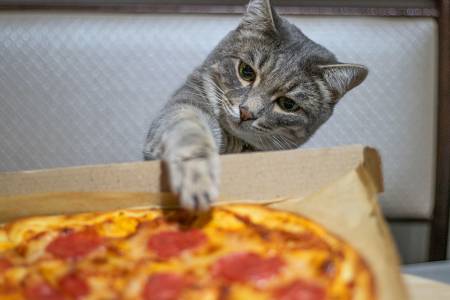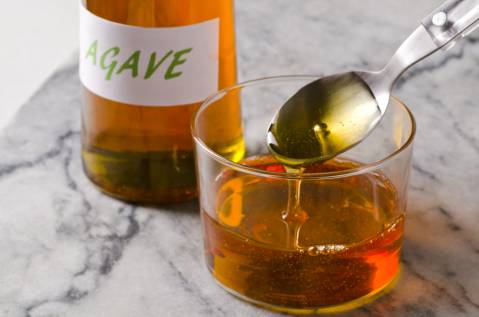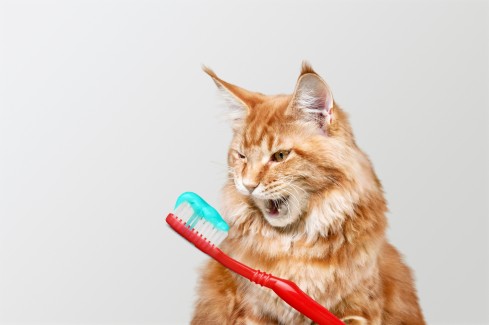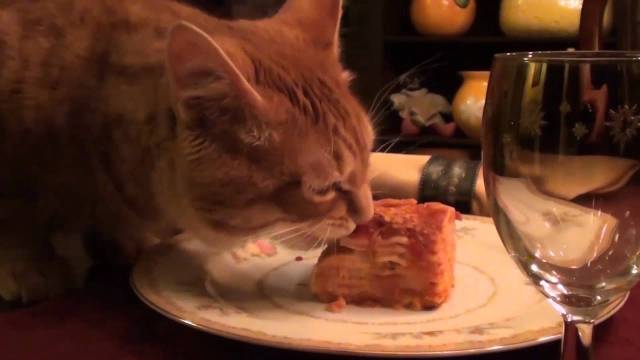Connect with a verified veterinarian in minutes. Licensed vets are available 24/7 to answer your questions. No need to worry about your furry family member.
There’s nothing like having a great pizza to enjoy on the weekend (or any time!). It’s a great way to relax and have dinner while streaming your favorite movies! As you watch your shows, all of a sudden, your cat comes up and takes a bite of your pizza. But what happens if a cat eats pizza?
Has your cat eaten pizza? Are you worried the pizza will make your cat sick? If so, you’ve come to the right place. We understand it can be scary when your cat eats something like this.
We’ve gathered information about pizza and whether it can make a cat sick. Let’s get started!
What is Pizza?
Pizza is an Italian dish that is flat and can be round, rectangular, or square. The base of the pizza is made of dough that’s topped with tomato sauce, cheese, and meat or other toppings.
Did you know that pizza is ancient food? Something similar to pizza has been made since about 10,000 BC! So, this yummy dish has a history dating back thousands of years. No wonder it tastes so good!
Today’s pizza originally came from Naples, Italy, some time between the 18th and 19th centuries. And the first pizzeria in the US was opened in New York City in 1905!
While pizza is a yummy dish for humans (in moderation), what about cats? Can pizza make a cat sick?
Pizza & Cats
Unfortunately, pizza is not good for cats. Some of the ingredients in pizza are toxic to cats, and some of the toppings are not suited for a cat’s digestive system.
A couple of ingredients in pizza sauce include garlic and onions. These are known to be toxic to cats and can cause severe anemia in our fur babies.
In addition, the pizza dough has too many carbohydrates for a cat’s system. Remember, cats are carnivores, and their diet doesn’t include many carbs. Pizza cheese is also not healthy for cats, as most cats are lactose intolerant.
Some meats used on pizza are also not safe for cats to eat. For instance, pepperoni. This contains garlic, spices, fat, and high levels of salt. Each of these can make a cat sick.
If your cat has licked the pizza or eaten some small pieces of pizza, she should be OK. However, if she eats a larger amount, she could become sick. It’s possible your fur baby could develop diarrhea, vomiting, and nausea.
These symptoms should pass within 12 to 24 hours; if not, it’s time to call the vet. The vet has medications that can stop diarrhea and vomiting.
We’re pretty sure if pizza makes your cat sick, she won’t be tempted to eat it in the future!
Connect with a verified veterinarian in minutes. Licensed vets are available 24/7 to answer your questions. No need to worry about your furry family member.

Julie
Julie is a graduate of the University of North Carolina, Wilmington, where she studied Animal science. Though contrary to the opinion of her parents she was meant to study pharmacy, but she was in love with animals especially cats. Julie currently works in an animal research institute (NGO) in California and loves spending quality time with her little cat. She has the passion for making research about animals, how they survive, their way of life among others and publishes it. Julie is also happily married with two kids.
Review symptoms, medications & behavior to keep your pets healthy with a Vet Online in just minutes.
Ask a Vet Live Now




